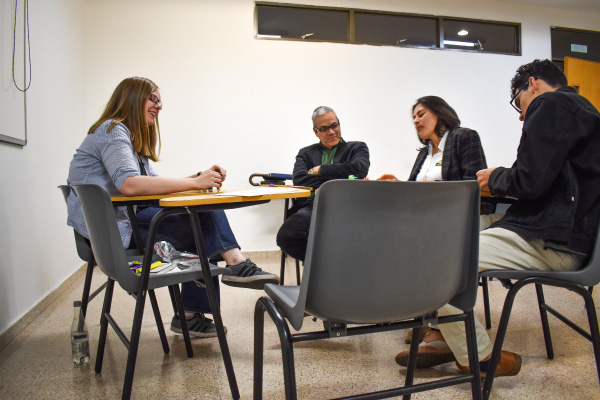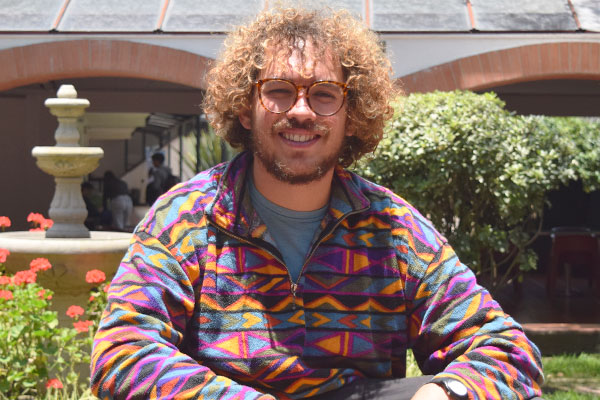Learning a new language is a challenge that requires discipline, and at Central University you will find people with similar goals who can support you.

Conversational clubs are thought to create the context for the practice of a new language; for this reason, the University has a lot of alternatives for you. In that way, it is important to find a space to develop all the levels of communication in a different language.
Shannon McKinney is one of the teachers of the English conversation clubs. She shares with Noticentral her experience learning Spanish in Colombia, and her perspective, as a professor, on the importance of finding opportunities to interact and socialize in English.
Getting over the fear of speaking another language, participation in structured activities, the internalization of the knowledge, and a deeper comprehension are some keys to improving your new language.
How did you become an English teacher?
After graduating with my bachelor’s degree, I got involved with an NGO based in the U.S. They sent me, along with around thirty other Americans and Brits, to teach English in schools and universities around Colombia. I had a fantastic experience during that year, so I decided to pursue teaching as a profession.
How long have you been living in Colombia? What do you like the most about living here?
I’ve been here for a little over four years. My favorite thing about living in Colombia is having the opportunity to learn and practice Spanish every day. People are generally friendly, so it’s easy to talk to them and establish regular interactions. I feel productive and proud when I have successful exchanges in Spanish throughout each day.
How did you get involved with Universidad Central?
I shared a mutual friend with the Department of Languages, and he introduced me to the director, Ruth Dominguez, when she was looking for a teacher to help with some classes. That first semester went relatively smoothly, and I’ve been here ever since.
What is the best thing about being a teacher at Universidad Central?
The best thing about teaching at Universidad Central is the community of people I have the opportunity to interact with each week. I love going to work and talking to my students about what is going on in their lives, and to be able to ask them questions about confusing Spanish words and phrases. My colleagues help me when I feel stressed or frustrated, and I get to benefit from their knowledge and advice since they are more experienced at teaching.
Everybody I interact with on campus, and around the university, is super nice and always willing to help me. It makes me feel good to be surrounded by so many people who want to take the time to get to know me, or to help me when I need it.
How would you describe your teaching method?
I try to make my classes as dynamic as possible by incorporating games, competitions, and longer-term projects. It’s important to me that the students have many opportunities to interact and socialize in English in order to get past the fear of speaking another language, so I try to get them involved with speaking with each other and with foreigners they meet in Bogotá or online.
What are the keys to effective language learning?
I think that a large part of effectively learning a language has to do with staying motivated to continue learning, and making it personal for yourself. There are so many resources and strategies available, but most successful language learners have a common drive and self-motivation. It can be easy to feel frustrated and discouraged sometimes when you’re learning a new language, so it is important to have a personal goal or connection in order to continue forward. I think the other key to effectively learning a language is being actively aware of the language you produce or experience. Critically examining vocabulary and grammar forces a deeper comprehension of the information which, I think, leads to greater internalization.
Why is it important for students and teachers to participate in the activities of the Languages Department?
I think that there are many reasons why participation in these activities is important. First of all, it’s a structured space where people can practice, and often receive feedback, without having to invest a lot of money. So, financially, it’s a good decision to take advantage of all of the free and low-cost options that are offered, even if they’re supplemental to a more intensive program or platform. Secondly, these events are fantastic opportunities to get past the fear of speaking other languages, and to realize that communication is possible even when you’re not perfect.
Finally, and most importantly, these activities provide a chance for students and teachers to meet and interact with each other, allowing them to build a supportive community in which collaboration fosters learning. Participating in the activities of the department doesn’t require a lot of investment, and it can benefit you in terms of confidence, fluidity, and community.
What would you say to the people who think they are too old to learn a new language?
Nobody denies the difficulties faced by older people as they attempt to learn new languages. As we age, the brain loses plasticity and that can make it hard for us to remember new information or acquire new abilities. However, up to a certain point, older people often compensate for this with their rich backgrounds, which provide them with numerous experiences to facilitate understanding via comparisons and connections.
What’s more, you can’t overlook the matter of motivation and dedication. Young people are sometimes distracted, or unable to fully commit to their studies, but older people are more accustomed to fulfilling responsibilities and they often are proven to be more ‘juicioso’ than their younger counterparts. So, an older person who is properly motivated, and who has time to dedicate to studying and practicing, is probably on equal footing with any number of younger individuals.









